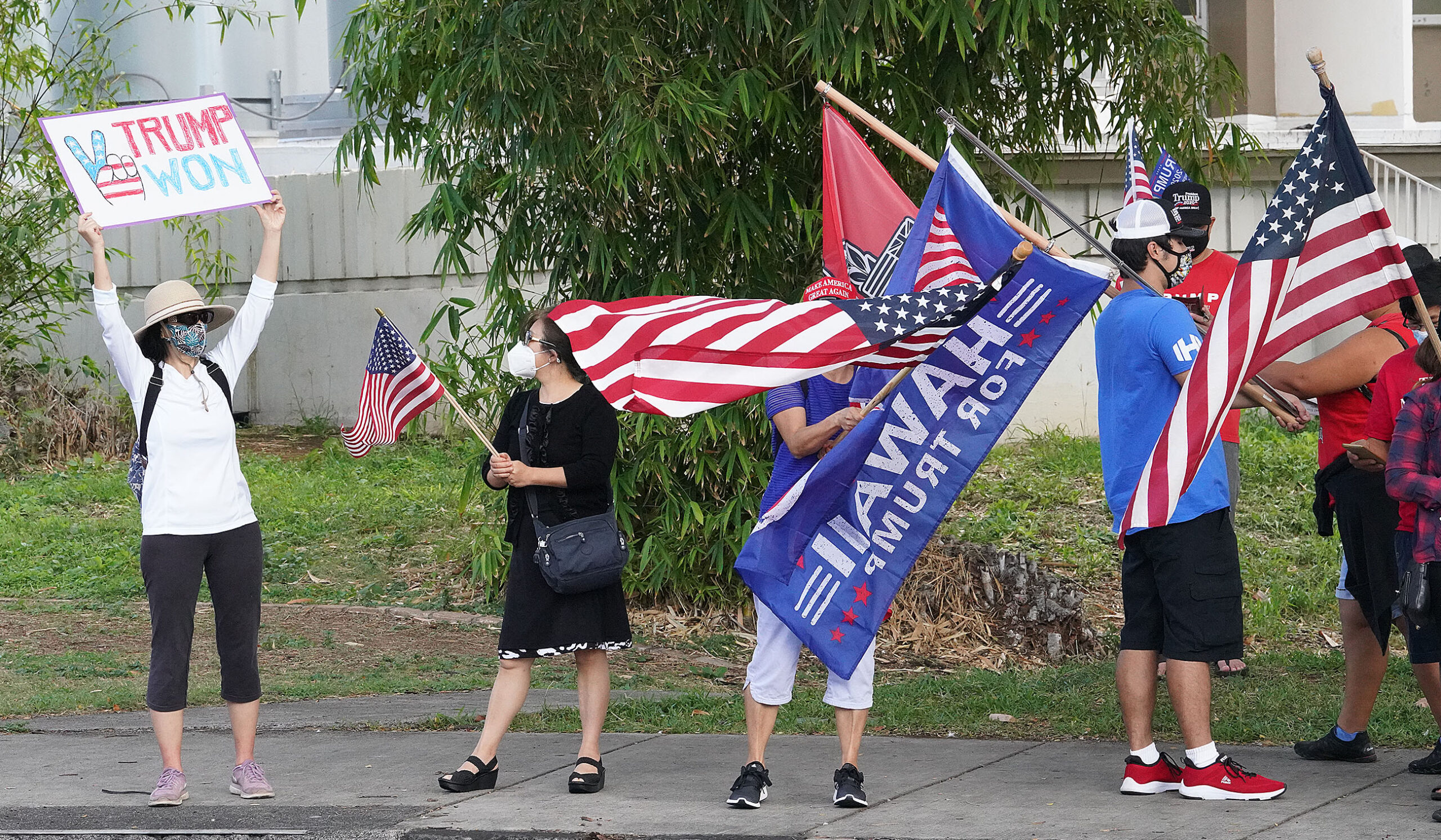Ben Lowenthal: The Surprising Persistence Of Conservatism In True Blue Hawaii
A look at the state's history shows that homegrown support for Donald Trump and extreme right-wing organizations didn't materialize overnight.
March 8, 2024 · 6 min read

About the Author
A look at the state’s history shows that homegrown support for Donald Trump and extreme right-wing organizations didn’t materialize overnight.
When Richard Nixon won his reelection in 1972, he won big. Not only did he get 49 out of 50 states in the union, but he was the first Republican ever to win Hawaii’s four Electoral College votes. The Honolulu Advertiser called it the “worst Demo drubbing since 1864.”
But even then, that was an anomalous national election. State and county races showed a steady and predictable landslide of Democratic wins.
The same thing happened in 1984 when Ronald Reagan won his reelection and became the last Republican candidate to take Hawaii. Like his economic policies, the win did not trickle down to local races.
For most of my life, the local Republican party has been getting trounced and although there have been a few breakthroughs by the GOP with Pat Saiki, Linda Lingle and later Charles Djou, politics in the islands have been firmly controlled by the Democrats.
That’s what makes homegrown conservatives so fascinating to me. During Donald Trump’s presidency, his loss, and well into President Biden’s term, a few local folks have taken a hard rightward turn politically.
I saw them for myself at a Senate Judiciary Committee hearing last month.
Sen. Karl Rhoads introduced a bill that would exclude any candidate who is disqualified by any constitutional or statutory provision. Of course, the bill was aimed at Donald Trump, whose qualifications are in jeopardy because of his involvement in the insurrection at the United States Capitol on Jan. 6, 2021.

Local conservatives came out in full force against the bill. At the hearing that morning, many not only opposed the bill itself but verbally sparred with Rhoads.
A few proudly donned red MAGA hats and someone wore a hat with an insignia of the Three Percenters, an anti-government organization with militia factions on the mainland and ties to other groups like the Oath Keepers. And they weren’t all angry, bearded white men either. They were a diverse group of people. Lots of them were home grown local folks and proud Native Hawaiians.
The hearings grew tense. While most of the people there opposed the bill and argued that it infringed on their right to vote, one of the testifiers lost his temper, pounded the table and started swearing at Rhoads for not knowing the state motto and coming from the mainland. Others in the crowd urged him to calm down and not get hostile.
All the while, near the back of the room Diamond Garcia, the Republican House minority floor leader from Ewa, sat and watched. The bill made it through the Senate and is awaiting a hearing in the House. If it gets a hearing — and that’s a big if now that the Supreme Court has kneecapped state efforts to disqualify Trump under the 14th Amendment — expect more opposition to it in the Capitol.
Perhaps surprisingly, right-wing politics is not new to Hawaii. Long before MAGA, the coopting of the Gadsden flag and Trump’s insurrection, a group of local folks gathered to take on a very different scourge invading the islands.
The year 1949 was a big one for communists. Mao Zedong was winning the civil war in China and established the People’s Republic of China that year. It was also the year the Soviets successfully detonated an atomic bomb on the steppe of Kazakhstan.
And while that was on the rise on the other side of the planet, the Territory of Hawaii was gripped by a dockworkers’ strike pitting the International Longshore and Warehouse Union against the Big Five. Many saw a connection between the strike and a world taken over by Communists.

At the American Legion Clubhouse one summer’s night, around 300 people formed the Hawaii Residents Association. Members declared that “I Might Undertake Anything” and the club cleverly called itself IMUA, the Hawaiian word meaning “forward” or “advance.”
Their objectives were clear. At the top, the group aimed to uphold and defend the “American” Constitution, combat communism and oppose those plotting “to destroy the right of individual enterprise and the employment opportunities of the workers of Hawaii.” They also claimed to support organized labor but abhorred any communist takeover.
This organization didn’t die out when the hysteria surrounding Reds ended in the 1950s. In fact, it carried on for decades. Over the years, as the threat of communists taking over labor unions waned, the organization morphed into a more generalized anti-communist group directed at student organizations, Asian communist parties and anything that smacked of collectivism in the islands.
Months after statehood in 1959, the group changed its name to the Hawaii Foundation for American Freedoms. The group held movie screenings of supposed communist activities on the mainland and abroad, had a library and claimed to educate the public about the perils against the American way of life.
It soon started supplying local libraries with books and reports on the horrors of communism. It proudly distributed copies of then-FBI Director J. Edgar Hoover’s “Masters of Deceit” and his advice on “how to stay free” throughout the state.
Perhaps the organization’s high point came in 1963, when it helped sponsor a trip for William F. Buckley, the conservative writer and thinker for the National Review, to come to Honolulu and address a crowd of about 320 people at a banquet hall in Honolulu.
Buckley told the crowd that the Democratic victories in Hawaii were a “sign of political immaturity rather than a sign of political prescience.” He called it a “cultural lag” with the mainland’s growing conservative force with the likes of Barry Goldwater, Richard Nixon and Ronald Reagan.
It’s been a long cultural lag. The conservative wave has never really hit the islands the way it washed over the rest of the country. But that did not slow down IMUA. It continued to write letters, promote an American way of life and hold annual meetings over the years. It finally dissolved in 1977.
I guess in the end the small and dedicated conservatives in the islands who came out to oppose the Rhoads bill shouldn’t come as a surprise. Those roots run pretty deep.
 Sign up for our FREE morning newsletter and face each day more informed.
Sign up for our FREE morning newsletter and face each day more informed.
Read this next:
Jonathan Okamura: UH Needs To Remain Committed To Diversity Despite National Backlash
By Jonathan Y. Okamura · March 10, 2024 · 6 min read
Local reporting when you need it most
Support timely, accurate, independent journalism.
Honolulu Civil Beat is a nonprofit organization, and your donation helps us produce local reporting that serves all of Hawaii.
ContributeAbout the Author
Ben Lowenthal grew up on Maui. He earned his undergraduate degree studying journalism at San Francisco State University and his law degree at the University of Kansas. He is a deputy public defender practicing criminal defense in trial and appellate courts. He also runs “Hawaii Legal News,” a blog covering Hawaii appellate courts. The author's opinions are his own and don't necessarily reflect those of Civil Beat. You can reach him at ben.lowenthal@civilbeat.org.
Latest Comments (0)
The truncated history of the Republican party in Hawaii, is that it's roots are intertwined with the Big 5.The present reality, is that (arguably) the majority of the voting populace in Hawaii are the descendants of those who's labor was taken advantage of by the Big 5. Thus it's unlikely Hawaii will vote predominately Republican anytime soon.This does not mean however Hawaii is a far-left State like CA, NY, WA, etc... We have a lot of DINOs in office, which is actually fortunate in some ways. There must be a balance in politics, otherwise the absence of moderate ideas give birth to extremes.
basic_citizen123 · 1 month ago
Awesome as Always Ben, come see us soon at Maui Historical Society.
CrystalMae · 1 month ago
"(Trump's) qualifications are in jeopardy because of his involvement in the insurrection at the United States Capitol on Jan. 6, 2021."The writer's bias is apparent. President Trump was not charged with "insurrection" much less convicted of it. Even the fakenews media stopped calling it the Jan. 6 insurrection. Now they're calling it the Jan. 6 Riots.It's funny that the writer appears to be concerned about "conservatives" in Hawaii. The democrats and their union bosses have had a chokehold on this state for decades. They control every level of government while the Republicans are non-existent. This state isn't a democracy. I am a lot more concerned about that than a few Republicans who don't matter.
Hoku · 1 month ago
About IDEAS
IDEAS is the place you'll find essays, analysis and opinion on every aspect of life and public affairs in Hawaii. We want to showcase smart ideas about the future of Hawaii, from the state's sharpest thinkers, to stretch our collective thinking about a problem or an issue. Email news@civilbeat.org to submit an idea.

